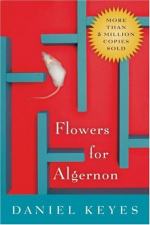|
|
Flowers for Algernon Author/Context
A native New Yorker and hero of the science-fiction genre, author Daniel Keyes was born in Brooklyn in 1923. He studied psychology and literature, earning his undergraduate and masters degrees from Brooklyn College. Keyes subsequently built a colorful résumé of odd jobs, including photographer, merchant seaman, ship's purser, fiction editor, high school teacher, and English professor at Ohio University.
Keyes first conceived Flowers for Algernon as a short story in 1959, for which he won the 1960 Hugo Award for Best Novelette of the Year from the World Science Fiction Society. In a 1997 interview with Locus Magazine, Keyes recalled clashing with his editors over the story's tragic ending:
"[An important editor named] Horace came in from the other room and said, 'Dan, this is a good story, but I'm gonna tell you how to make it a great story: Charlie does not lose his intelligence; he remains a super-genius, and he and Alice fall in love, they get married, and live happily ever after.'..."
Going against his editor's advice proved rewarding, for the story of Charlie's mental rise and fall pulled on the public's heartstrings and achieved enduring success. The story came to the small screen in a 1966 televised play, "The Two Worlds of Charlie Gordon," was expanded into a full-length novel in 1966, and inspired the1968 film, "Charly," for which Cliff Robertson snagged an Oscar for best-actor. Of his own story, Keyes wrote in the Library Journal:
"Flowers for Algernon is the story of a man's inner journey from a world of retardation to a world of high intelligence. Charlie Gordon lives through comic, sad, and ironic experiences as he emerges from mental darkness, through the various stages of perceiving and understanding levels of knowledge, into the light of complex awareness of the world, of people, and of himself." (Small, 251)
As scholar Robert Scholes notes, Flowers for Algernon transcends the genre of science fiction through its emotional mass appeal. "This tale is beautifully problematic," he says. "It conveys to us the deprivation involved in mental retardation as no amount of reports or exhortations could possibly do it." (57) Echoing Scholes' praise, critic Robert Small, Jr. commends the novel's journalistic style, saying "...the story as told through Charlie's own journal, effectively carries out one of the main qualities that proponents of literature claim for it, immediacy of experience, that is, empathetic power." (252)
Daniel Keyes' acclaim, however, was not universal. Some critics found his novel pornographic, sexually explicit, and irreligious. Consequently, censors kept Flowers for Algernon on the top of their "banned books" list for years (Small, 254). Though best known for Algernon, Keyes' prolific body of published works also includes novels The Touch (1968), The Fifth Sally (1980) and Unveiling Claudia (1986), the non-fiction true-crime novels The Minds of Billy Milligan (1981) and The Milligan Wars (1986), many short fictional pieces, and the recent memoir, Algernon, Charlie and I : A Writer's Journey (2000).
Bibliography
Brown, Charles N. "Daniel Keyes: 40 Years of Algernon." Locus Magazine, Vol. 38 No. 6, Issue 437, June 1997.
Keyes, Daniel. Flowers for Algernon. New York: Bantam Books, 1975.
Scholes, Robert. Structural Fabulation. University of Notre Dame Press, 1975.
Small, Robert, Jr. "Flowers for Algernon by Daniel Keyes. " Censored Books, Critical Viewpoints. Metuchen, NJ: Scarecrow Press, 1993, pg. 249-55.




